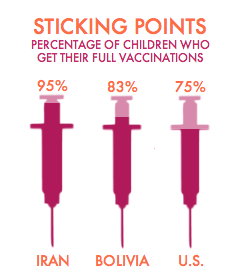
August 6, 2013 | Violence Against Women
A Catcall is Not a Compliment
The site that bites back at sexist behavior
Everyday Sexism founder Laura Bates
"Every time I go running I get comments of 'nice a__' and 'look at those shorts' from guys on the street. When I don't respond, the comments usually progress to 'don't be a b__' and 'it's a compliment, babe.'"
Sound familiar? Most of us have been subjected to verbal harassment—or much worse—but now there's a website, Everyday Sexism, where women can catalogue the catcalls and abuse and vent about how that makes them feel.
Tens of thousands of women, including "M," who posted the anecdote above, have contributed to the site since Laura Bates launched it in February 2013. Bates, a twentysomething actress turned activist, created the Everyday Sexism Project after getting fed up with the excuses she kept hearing for sexist behavior. "'Oh, we don't know the full story,'" she mimics. "'She's making a big deal out of nothing. I'm sure he didn't mean it that way.'"
So Bates fired off an angry tweet heard 'round the world, which asked women to contribute their own experiences of sexism.
Now there are Everyday Sexism sites for 16 countries, with entries topping 40,000 posts. The submissions run from a few words to paragraphs. A woman calling herself A.C. recently posted an entry just shy of a thousand words, two separate stories of horrific molestation and abuse. At the end, she wrote a tiny apology, bracketed in parentheses like a whisper: "(sorry it's so long, I just felt I had to get this out)"
Part of what Bates loves about the site, despite the depressing content, is its cathartic and educational power. Rape victims have told her that Everyday Sexism made them comfortable sharing their stories. Other fans are equally effusive. Recalls Bates: "We have a lot of people, young women, writing in saying, I felt so alone, it was so hard to stand up to sexism. But now that I've found this, I feel like I have people behind me and supporting me in a way I never did before."
"It's actually quite amazing how similar so many of the experiences are," adds Bates. "Not just across different countries, but also you know, teenage girls and elderly women reporting the same thing, disabled women, women of all different races and sexual orientations, a woman who works in a videogame store reporting an almost identical experience to a person who works in a city job, at a law firm."
With the clout of more than 85,000 Twitter followers, Everyday Sexism has proven it can actively fight sexism, not just report it. Bates organized the #FBRAPE campaign in conjunction with Women, Action, and the Media in order to get Facebook to monitor the sometimes violently misogynistic content on its pages. Thanks to the campaign, Facebook now deletes anonymous content reported as being sexist.
Bates' Twitter handle also has the power to defeat sexist advertising outside the digital world. After Bates tweeted about an ad that ridiculed prostitution and sanctioned fat-shaming, the offensive material was discontinued.
Everyday sexism can be defeated, Bates believes. All it requires is everyday acts. "There's a huge amount to be said for tackling bystander inaction. I believe very strongly that a lot of times we have the legislation in place, but it isn't translating into reality," says Bates, her voice fraying with anger. "So the next time that someone grabs my leg on the bus, I would hope that one of 20 people that looked out the window and pretended it wasn't happening might actually stand up and say, that's not ok and step in. It can be very, very small things that we need."